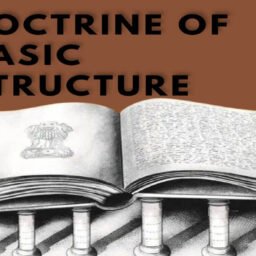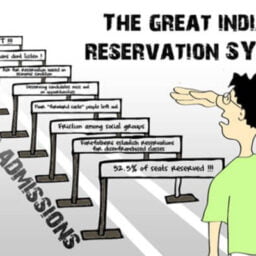INTRODUCTION
India is a country of people from various Religions, faith, culture and practices. The people of India has been governed by personal laws of their respective religion for many years and Goa is the only state that has a uniform code called as Goa civil code. These personal laws are created by considering different customs followed by respective religions or communities. These laws deal with the subject matters of marriage, divorce, inheritance, succession. Personal laws in some cases contradict the constitution and also denies fundamental rights to women. The introduction of personal laws regarding religious issues started in the British colonial system and then after independence, lawmakers of the constitution was reluctant to change or reform religious personal laws. But lawmakers included the Uniform civil code in article 44 of the constitution of India by manifesting the idea of the Uniform civil code in India.
The Uniform civil code(UCC) is the most debated topic since independence by many prominent personalities. The constituent assembly had many discussions regarding UCC on its part. The constituent assembly took up a draft article on UCC for discussion of opinions in 1948. The draft stated that the people are governed by Uniform Civil Code across Indian territory. The opposition for a draft of UCC mostly from Muslim members of the constituent assembly as it would curtail the main objective of the Indian constitution such as freedom of religion, it would interfere in personal laws of community without acceptance of religious authorities and would create conflict within the community. The members who supported UCC argued that it would support the unity of the country as well as secularism, equality.[1]
UCC – DIRECTIVE PRINCIPLES OF STATE POLICY
The Uniform Civil Code was incorporated in article 44 of the Indian constitution as DPSPs that states “the state shall endeavour to secure a Uniform Civil Code for the citizens throughout the territory of India”[2]. The DPSPs are not enforceable by any court in case of its violation as stated in the Indian constitution that says “The provisions contained in this Part shall not be enforceable by any court, but the principles therein laid down are nevertheless fundamental in the governance of the country and it shall be the duty of the State to apply these principles in making laws”. [3]
The name itself says that DPSPs are the principles or rules to direct the state in making laws and it is an objective of a nation India for the welfare of people. This indicates that the constitution supports the incorporation of UCC in DPSPs in any way not making it compulsory but debatable when it is needed. The Opposition for the UCC draft mainly pointed out that this code would curtail the freedom of religion of an individual, but the main objective of this code is to support secularism ensuring national unity as well as equality.
FREEDOM OF RELIGION
The reason behind UCC is not insisting on one religious person to follow another religion or restricting one person from following their religious customs. The UCC is thought of bringing every individual in the country under one common law and avoiding the practices that promote inequality, discrimination, violation of fundamental rights. India needs a common codified law binding all personal laws which are truly secular and rational. There are many castes and faiths, as well as their respective sets of practices and beliefs, which are bewildered, but nowhere else is a situation like India’s, where multiple personal laws overlap and are permitted.
India has personal laws for many years and it cannot be changed in a short span, there is a need for wide acceptance of UCC from various communities. The establishment of UCC in India does not curtail freedom of religion as stated in articles 25 to 28 of the Indian constitution. A Uniform Civil Code applies the very same collection of secular civil laws to persons of different religions and faiths. This prioritizes citizens rights to be governed by various personal laws depending on their religion or culture.[4]
Personal laws and religion are two different things where introducing UCC would not affect religion or religious beliefs. Religion is based on worship, faith, beliefs, rituals and it has nothing to do with personal laws as it deals with marriage, divorce, inheritance, succession rules. The political parties or religious authorities were reluctant to UCC considering it as interfering in religious issues.[5] Uniform Civil Code is a common civil code for all citizens of India that promotes equality and secularism without violating minorities religious freedom as stated in the case S.R.Bommai v. Union of India[6], the fundamental characteristic of India’s Constitution is secularism. It further stated that politics and religion should not be combined. If the state pursues nonsecular policies or actions, it is violating the constitution’s purpose. All citizens of a nation are equal and should be treated as such.
EQUALITY
In the coming years, the Uniform Civil Code will secure equality among people. Other personal laws have been updated, but Muslim law hasn’t. Allowing Muslims, for instance, to marry several times but condemning Hindus or Christians for the same makes no logical sense. As a result, there is a need for a uniform civil law that applies to all religions. UCC will also contribute to the promotion of gender equality and grants women more rights according to certain progressives and women’s organizations.
As we all saw in the case of Mohd. Ahmad Khan v. Shah Bano Begum & Ors[7] popularly known as the shah bano case, the whole Muslim community turned against the court’s judgement as to provide maintenance of wife and children by a husband after divorce under article 125 of Cr.P.C contradicting Muslim personal laws, that says maintenance need to be provided by husband in the period of iddat. This case was seen as a turning point because it went beyond the standard practice of judging cases based on personal laws and emphasized the importance of implementing the Uniform Civil Code. It also noticed various personal laws, as well as the necessity to recognize and tackle gender-based inequality and discrimination.
In the case of Shayara bano v. union of India and Ors[8], shayara bano filed a writ petition before the supreme court claiming triple talaq, nikkah halala and polygamy constitutionally invalid as it violates Article 14, 15, 21, 25 of the Indian constitution. The 5 judge bench on 22nd august 2017 held that talaq is unconstitutional to practice. These practices are still in practice which is completely discriminatory and unconstitutional in Nature. All these customs and practices are turned against women fundamental rights, which in turn violates the basic feature of the constitution and its objective.
The advantage of adopting this code is that it will ensure national unity and integrity, as well as end discrimination against women and reinforce the secular fabric. It should be underlined that, as evidenced in the cases Shah Bano to shayara bano, the focus has been solely on gender-friendly personal law amendments. Many Islamic countries like Pakistan have already reformed their Muslim laws more than India regarding discriminatory clauses. Hindu laws are discriminatory at first but they underwent various changes regarding their procedure and practice by considering the basic structure of the constitution like fundamental rights. The equal rights on father’s property for daughters is also granted by amending the Hindu succession act on 9 September 2005. In 2003, the supreme court struck down section 118 of the Indian succession act that prohibits Christian from giving property to religious or charitable institutions on will as unconstitutional by mentioning the importance of a uniform civil code.[9]
CONCLUSION
As per the layman, the law of a country needs to be just and non-discriminatory by protecting fundamental and constitutional rights. UCC is always a need for Indian society as the personal laws are always gendered discriminatory and violative of the basic structure of the Indian constitution by not governing all people equally. The Uniform civil code does not target or specifically change laws of one religion, but its main objective is to bring change in personal laws which are gender-biased and discriminatory. UCC does not stop or prevent people from following the religious rituals, faiths, which ensures every person follow their customary rituals like saptapadi for Hindus. Codification of personal laws in the form of a uniform civil code would ensure gender equality as well as freedom of religion which is very much needed for a democratic country like India.
Author(s) Name: K. Srivalli vaishnavi (Damodaram Sanjivayya National Law University, Visakhapatnam)
References:
[1] Constituent assembly of India debates, 23 Nov 1948, volume VII
[2] The Indian constitution, article 44
[3] The Indian constitution, article 37
[4] Raya hazarika, ‘should India have a Uniform Civil Code?’,legal services India <http://www.legalservicesindia.com/article/394/Should-India-have-a-Uniform-Civil-Code?.html> accessed 22 September 2021
[5] G.L.Verma, ‘why India needs a Uniform Civil Code’, the statesman(10 sep 2020)<https://www.thestatesman.com/supplements/law/india-needs-uniform-civil-code-1502922940.html>
[6] S.R.Bommai v. Union of India, Air 1994 SC 1918
[7] Mohd. Ahmad Khan v. Shah Bano Begum & Ors, 1985 AIR 945
[8] Shayara bano v. union of India and Ors, (2017) 9 SCC 1
[9] Raya hazarika, ‘should India have a Uniform Civil Code?’ legal services India <http://www.legalservicesindia.com/article/394/Should-India-have-a-Uniform-Civil-Code?.html>accessed 22 September 2021
















